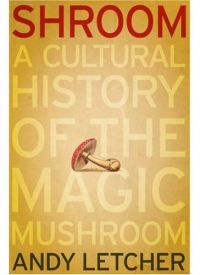Shroom, by Andy Letcher, is that most wondrous of finds; a magic mushroom book that dares to confront modern orthodoxy, and does so in a way that actually advances our knowledge in the field. Billing his text as "A Cultural History of the Magic Mushroom", Letcher does not disappoint in dishing up the tastiest mushroom morsels modern research can unearth. And for those of you who think you "know it all" already, I assure you, this book has the best a fungophile could hope for: New stuff.
Instead of starting at the dawn of time with proto-hominids chomping down mushrooms and inventing religion -- like most trendy mushroom books would have you believe -- Letcher instead takes an about-face and scrutinizes this myth of the "ancient mushroom cult" as well as the visionaries who elevated it to the status of academic lore. After first picking through the research and finding no hard evidence of this supposed ancient mushroom cult, Letcher then goes on to point out that for the bulk of Western history (pre-20th century at least), mushrooms were simply considered to be "poisonous" or "edible", and there was no in-between. The poisonous ones (including the "psychedelic" ones) were assiduously avoided and eaten only by mistake. This he demonstrates by finding literature which dates back to the 13th century, citing botanist's notes and journal reports of people accidentally ingesting poisonous mushrooms and believing they were at death's door. Although the notes from the doctors at the time report the oddest of symptoms (the poor fools had no idea what to make of "giddiness" that caused unceasing laughter), in hindsight it is clear that these are the earliest "trip reports" on record. As a student of mushroom lore for over twenty years I can honestly say I had no idea these early reports actually existed, and I applaud Mr. Letcher for his scholarship in retrieving them from the depths of history.
Comparing these priceless journal articles with the historical accounts of the first Spaniards to witness Mayan consumption of mushrooms, Letcher makes the case that Westerners simply had no idea what to make of this ritual, and considered it pagan and demonic and best, deadly at worst. If "Shroom" had ended here Letcher's point would have been well made with interesting research to boot, but it does not end here. Letcher pushes forward into the roots of the cultural movement that elevated the humble mushroom into an archaic religious symbol for an increasingly cynical age, and the primary target of this academic hit job is the legendary banker-turned-amateur ethnomycologist R. Gordon Wasson, the originator of the sacred mushroom myth. To say that Letcher has a bone to pick with Wasson would be putting it mildly. Let's just say Letcher barely masks his glee in annihilating this man's historical legacy, not only peeling apart his legendary theories one after the other, but criticizing the man himself for being somewhat stubborn and single-minded; too blinded by his own theory to do the proper research; too quick to mold the facts to meet his preconceptions; too arrogant and forthright to allow dissenting voices to penetrate his mythos. It is a view of Wasson I have never seen before -- including new insights into his relationship with Maria Sabina -- and like much of this book, contains a wealth of new material.
The second half of the book moves into hippie territory, speeding through Leary and the Sixties, which is all well-chewed territory. However, the freshest bits in this section come from stories of pre-MDMA rave culture in the UK, where free mushroom festivals and Stonehenge concerts were the British Isles equivalent of Woodstock and the Grateful Dead shows in the US. You can almost feel the change in the air when -- in the early 80s -- DJs with electronic beats and designer drugs moved in and rapidly took over the scene. This is when Letcher changes gears and gets into analyzing Terence McKenna's "Elf Clowns of Hyperspace". While Letcher is a bit gentler with McKenna than he was with Wasson (he claims that as a young man Terence "blew his mind" with his live rap), he still spares no organ in the body of Terence's work as he happily disembowels theory after theory. Letcher's middling conclusion is that although Terence was a great storyteller who helped popularize the mushroom, his theories and research skills -- like those of Wasson's -- were ultimately lacking in academic rigor and not to be taken seriously.
There's much more in
Shroom worth mentioning -- new takes on Siberian shamanism, an analysis of mushroom use in Mayan culture, Amanita myths derailed, the modern commodification of the
psilocybe market -- but I don't want to spoil all the surprises. The fact that I found this book so full of new material should be recommendation enough for people out there who think they know all there is to know in this field. If Letcher's work doesn't turn the magic mushroom crowd on its head, it will at least give them a new perspective on our current misshapen paradigms. Some mushroom enthusiasts spend their entire careers on the other side of the looking glass, but Letcher's climb up out of the mycological rabbit hole has let in a much-needed breath of fresh air.
Shroom is definitely the new must-have book for all students of modern mycology. It makes everything that has come before it look like a fairy tale.






















The comments posted here do not reflect the views of the owners of this site.